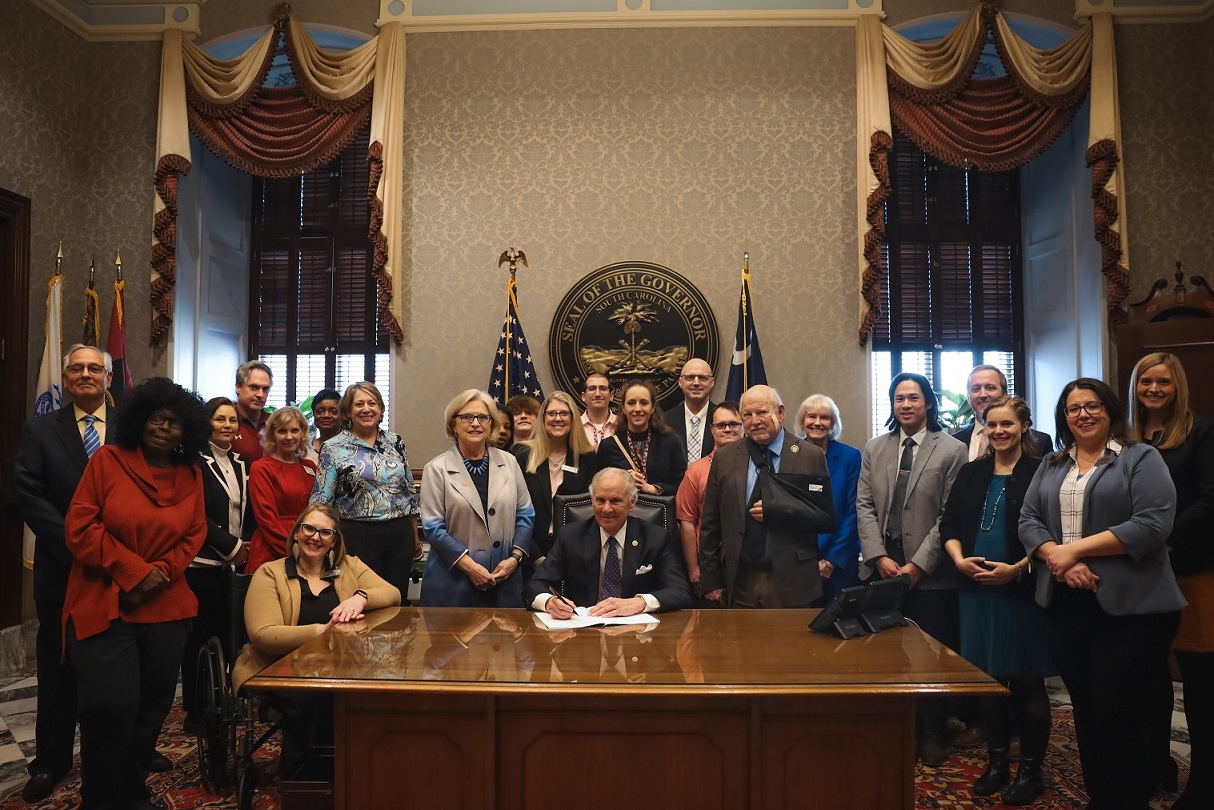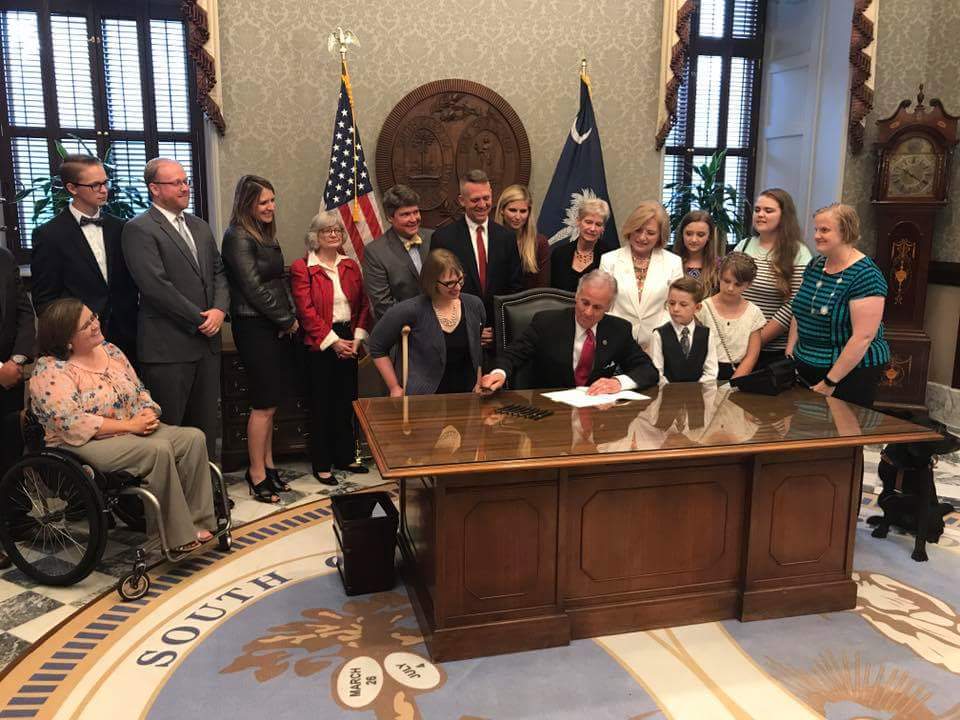Employment First Initiative Act & Ending Subminimum Wage

On May 23, 2022 (S.533), a bill to end subminimum wage in South Carolina, was signed into law by Governor Henry McMaster following years of grassroots advocacy by Able SC and partners. South Carolina became the third state in the Southeast and the thirteenth in the nation to pass legislation, breaking from federal law by ending subminimum wage.
Part of the bill’s successful passage included an amendment to combine S.533 with the Employment First Initiative Act ( H.3244). “Currently, South Carolina has one of the highest unemployment rates for people with disabilities. Dated policies and lack of coordination have withheld opportunities for individuals with disabilities to succeed in the workforce," said Kimberly Tissot, CEO of Able SC.
Employment First means that employment in the community should be the first and preferred option for people with disabilities. It means real jobs for real wages. Learn more about employment first here.
- This Act will develop the Employment First Oversight Commission. An oversight commission is a group of people who have the authority to study and make recommendations about a topic.
- This would make our state a leader in inclusive hiring practices. This means hiring people based on their skills and abilities, regardless of whether they are disabled or not.
- This Act would encourage businesses to include people with disabilities in the workforce by providing incentives. An incentive is a payment, tax break, lowered fee, or no-cost option to encourage people and businesses to do something.
"The Employment First Initiative Act will help our state agencies become model employers by changing policies and procedures and increasing collaboration. Combining the Employment First Initiative Act with the bill to end subminimum wage promotes inclusive employment for individuals with disabilities in South Carolina,” says Tissot.
In 2021, 1,800 South Carolinians with disabilities are limited to “work activity centers” or sheltered workshop settings. These are places where people with disabilities are segregated from non-disabled people to work for subminimum wages. They may make less than one dollar per hour. From these settings, less than 5% transition into community-based employment. These are jobs where people with disabilities can work alongside non-disabled peers.
South Carolina’s bill prioritizes the stability of individuals with disabilities who are currently subject to subminimum wage by developing a task force to create a two-year transition plan to phase out subminimum wage by August 1, 2024, ensuring that those currently working under subminimum wage can successfully transition to other types of employment.
In reaction to the bill’s passage, Tissot shared, “Ending subminimum wage is finally employment justice for people with disabilities! We are thrilled by the result, ensuring that people with disabilities are valued and equal members of South Carolina’s competitive workforce. We applaud the leadership of Senator Katrina Shealy, Senator Tom Davis, Representative Neal Collins, and Representative Bill Sandifer for ensuring overwhelming support in the General Assembly. We commend South Carolina’s lawmakers for supporting the rights of the 1,216,011 people with disabilities in our state. Today marks a new future for people with disabilities in South Carolina.”
Persons With Disabilities Right To Parent Act
On May 11, 2017, South Carolina Governor Henry McMaster signed House Bill 3538 which amended South Carolina Code to add a new chapter, the “Persons with Disabilities Right to Parent Act”. Able SC worked with partners including the Department of Social Services (DSS) and Protection and Advocacy for People with Disabilities, Inc. to draft a bill that codified best practices for ensuring the protection of the rights of individuals with disabilities.

The law requires the DSS, law enforcement, and the family and probate courts, among others, to protect the parenting rights of people with disabilities by establishing requirements and safeguards applicable in child custody, child protection and probate guardianship proceedings to ensure that persons with disabilities are not denied the right to parent or to have custody of or visitation with a child because of a disability; and to prohibit child placing agencies and adoption service providers from denying persons with a disability the right to access services because of the person’s disability. Additionally, the law prohibits termination of parental rights solely on the basis of a disability. Prior to this law passing, South Carolina had legislation allowing disability as the sole grounds for removing and terminating parent rights, even without evidence of abuse or neglect.
South Carolina Department of Social Services Director Susan Alford said, “The Department of Social Service’s mission is to protect the safety and welfare of children and strengthen South Carolina families. H.3538 affirms the Department’s commitment to fulfill that mission without regard to a parent or guardian’s disability and underscores that the focus in all of the Department’s proceedings should be on the best interests of a child. Every decision we make should be premised on whether an individual, disabled or not, can protect the safety and wellbeing of a child. We appreciate the support of Governor McMaster, Rep. James Smith, Sen. Katrina Shealy, and the General Assembly for their support of H.3538.”
Kimberly Tissot, Executive Director of Able SC said, “Able SC looks forward to working with the SC Department of Social Services to ensure that the rights of parents with disabilities are protected. People with disabilities, including physical, visual, intellectual, developmental, hearing, psychiatric and other disabilities have the same right to bear and raise children, become foster parents, and adopt a child as any other citizen. The new law also helps with removing the negative perception of what people with disabilities can do. As an organization run and operated by the majority of people with disabilities, we are so thankful for the General Assembly for their leadership in supporting this important disability rights legislation.”
“It was an honor to work with Able SC and partners to enact this important piece of legislation. It’s exciting for South Carolina to be at the forefront around this issue and to advance disability rights in our great state.” said SC Representative James Smith.
Able South Carolina is so appreciative of all the supporters, especially the bill sponsors, Representative James Smith and Senator Katrina Shealy; the General Assembly; The Department of Social Services; Protection and Advocacy for People with Disabilities, Inc.; The SC Developmental Disabilities Council; American Bar Association; Disabled Parenting Project; National Council on Disability; Through the Looking Glass; and the many parents with disabilities who shared their stories and provided testimony.
PARENT FACTSHEET: Your Rights as a Parent with a Disability (PDF)
LAWYER FACTSHEET: Representing Parents with Disabilities (PDF)
DSS AND CHILD WELFARE PROFESSIONALS FACTSHEET: Parents with Disabilities and their Rights (PDF)
More Information about the Persons with Disabilities Right to Parent Act.


